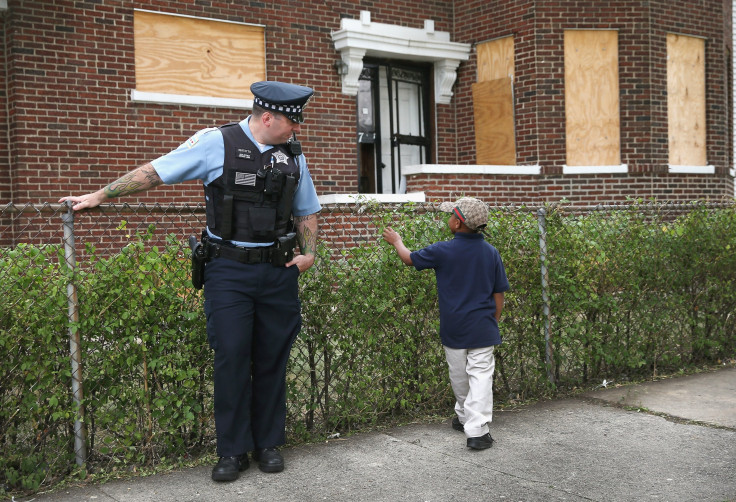US Educators Racist? School-To-Prison Pipeline Targeted By Arne Duncan Often A Diversity, Training Problem

Ahmed Mohamed may be the most well-known student to be arrested at school, but he certainly wasn't the first. In Milledgeville, Georgia, there was Salecia Johnson, a 6-year-old handcuffed after having a temper tantrum. In Jefferson Parish, Louisiana, there was the unidentified 15-year-old booked after throwing Skittles on the bus. In San Jose, California, there was Adrian Crosby, an autistic 13-year-old charged after writing his name on the school sidewalk.
"It was horrendous," said Aida Crosby, Adrian's mother. "It is a very huge, bizarre thing culminating into [the fact that] now, my child has a criminal record."
As school shootings have increased in frequency, so has the police presence on grade and high school campuses. But in some places, due to everything from budget cuts to department loyalty, officers have begun to arrest students for lesser crimes, taking over administrators' role as the primary disciplinarians. Studies have found minority students are disproportionately affected by these systems, and they're often the most vulnerable to what's been termed the "school-to-prison pipeline," in which kids get arrested at a young age for something minor and end up spending their lives in jail for serious offenses later on.
Education Secretary Arne Duncan wants that trend to stop. In a speech Wednesday, he proposed that states and school districts curb student arrests and use the $15 billion saved to fund teacher raises at high-poverty schools. “Every day, as a society, we allow far too many young people to head down a road that ends in wasted potential. And sometimes, we are complicit in that journey to nowhere,” he said. “We need to do more to change that.”
Advocates say the school-to-prison pipeline may be real, but fixing it will require more than an Education Department initiative. Schools need to improve their environments, shift their policies and train their teachers to handle students without police intervention. They argue it could be symptomatic of a larger issue of institutionalized racism and misguided law enforcement.
"Too often, police are called in for things that are school crimes against school code -- not penal code," said Bryan Joffe, project director of education and youth development for the American Association of School Administrators, a professional organization in Alexandria, Virginia. "There's a role for police and security on our grounds, but it's not about policing the students in the building."
The number of school resource officers climbed nearly 40 percent between 1997 and 2007, with certain groups of students arrested more than others. Black students comprise less than one-fifth of the student population but represent one-third of students arrested for school-related incidents. Disabled students make up 12 percent of enrollment but 25 percent of school arrests, according to data from the Office of Civil Rights.
The issue of school security entered the spotlight after the 1999 shooting at Columbine High School in Columbine, Colorado, that killed 12 students and one teacher. It re-emerged as a national problem after a 2012 shooting at Sandy Hook Elementary School in Newtown, Connecticut, resulted in the deaths of 20 first-grade students and six adults. In the year and a half after the Sandy Hook massacre, there were more than 70 school shootings, the Los Angeles Times reported.
Aida Crosby said she was shocked when she got the phone call from police that her son had been accused of vandalism at school. Adrian's citation -- which NBC reported appears on his record as an arrest -- came after years of battling the district over his diagnosis and school resources, his mother said.
"When a kid's not understood, not guided, not taught, they call the police on them," Aida Crosby said. "The whole educational system has to change."
Rico Gutstein, a University of Illinois at Chicago professor who's spent years teaching math in city schools, said he thinks there's an inordinate emphasis on controlling minority students in part because teachers don't understand diversity. They try to manage kids rather than treat them as people, so the kids act out. "There's a tremendous amount of resistance from young people when they feel devalued, dehumanized and disrespected, and they will resist those things in a myriad of ways," said Gutstein, also an organizer for Teachers for Social Justice. If teachers punish the resulting bad behavior, it just makes the situation worse.
Gutstein said that could start a child who may already be disadvantaged down a path to failure. Duncan referenced statistics Wednesday that supported this: About two-thirds of inmates in state prisons did not finish high school, he said. Young black men who didn't graduate were more likely to be in prison than hold a job.
This might not happen so frequently if teachers were trained differently, said Sarah Iverson, an associate policy fellow at the New Haven-based think tank Connecticut Voices for Children. She proposed the graduated response model where instructors give warnings before moving to calling police, juvenile review boards or restorative justice practices where students talk about what's bothering them. "A student speaking on a cell phone probably shouldn't end up a police station because there's a host of negative life outcomes," Iverson said.
Jimmy Womack, the president of the Texas School District Police Chiefs Association, said his officers wrote fewer than 100 citations for a student body of 34,000 over the past year. He chalked this up to his personnel, who he said weren't "street cops" on contract but officers who knew how to deal with kids. Womack said that's an important factor to consider when trying to reduce arrests. For example, law enforcement doesn't necessarily need to make arrests when students bring water bottles of wine to school or start fights in the hallways, he said.
"I would much rather kids be educated...than have to put handcuffs on any of them," Womack added. "Sometimes you've got to use a little common sense."
© Copyright IBTimes 2024. All rights reserved.






















